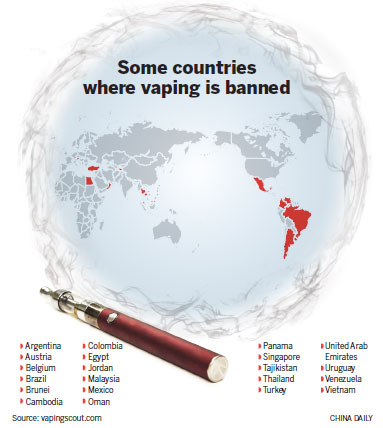Hong Kong pushes e-cigarette ban as tobacco fight gears up
Authorities urged to take bold step but some fear backlash
Hong Kong is one step closer to a complete ban on the sale and promotion of e-cigarettes, as part of a major public health push that has also fueled debate on its effectiveness.
The legislative council of the special administrative region has gone through the first and second readings of a government-tabled bill to amend a smoking ordinance targeting alternative smoking products like e-cigarettes. The bill has now been passed to its house committee to follow up.
The ban, which includes the import, manufacture, sale, distribution and advertising of alternative smoking products, will come into force after six months if the bill is passed, according to the Food and Health Bureau. Once it takes effect, violators face jail terms.
Instead of burning tobacco, e-cigarettes commonly consist of small, battery-powered cartridges shaped like traditional cigarettes and are designed to transmit vaporized liquid nicotine through "vaping". The devices contain ingredients such as the synthetic organic compound propylene glycol and flavoring agents.
During the proposed amendment's second reading, Secretary for Food and Health Sophia Chan Siu-chee said the government hopes to lower the smoking rate. But some have raised concerns about consumers being less conscious of the hazards linked to alternative smoking products, with many businesses branding these products as less harmful than traditional cigarettes.
The Hong Kong Council on Smoking and Health welcomed the legislative move.
"We press for immediate review and endorsement by the LegCo to protect public health," said council chairman Antonio Kwong.
"We also propose that the government takes a bold step to formulate a goal and timeline for a total ban of smoking in order to protect the public from tobacco hazards and achieve a smoke-free Hong Kong."
Daniel Ho, associate professor at the School of Public Health, University of Hong Kong, also supported the move. While it is unlikely that the city will ban traditional cigarettes, banning new products like e-cigarettes is reasonable, especially as they are attractive to teens, he said.
In a survey released in October, The Boys' and Girls' Clubs Association of Hong Kong charity group said that 6.2 percent of those polled under the age of 18 have tried vaping, with about 40 percent seeing that as a healthier choice over traditional cigarettes.
"The smoking rate in Hong Kong is already very low at just 10 percent, which is one of the lowest in the world," Ho said.
"Conventional approaches to reduce the smoking rate have proven to be effective, and we don't need these new products to help bring numbers down further."
Vaping could also draw people who have never smoked and once used to it, they may move on to traditional cigarettes, Ho said.
Nav Lalji, chairman of the Asian Vape Association industry group, expressed disappointment with the latest bill.
Regulating products instead of banning them is more rational and logical, Lalji said. There are about 40 to 50 entities selling e-cigarettes in Hong Kong, including retailers, online merchants and wholesalers, while the number of people vaping daily is about 5,000 to 6,000, he said.
"The impact of banning e-cigarettes would be detrimental because these people vaping to cut down on or quit cigarettes will have no choice but to go back to conventional cigarettes, which are scientifically more harmful than e-cigarettes," Lalji said.
According to Public Health English, an agency of the UK department of health and social care, vaping is at least 95 percent less harmful than smoking.
The Asian Vape Association will devise a plan and approach decision-makers to allow the industry's voice to be heard, Lalji said.
Globally, there are about 35 million e-cigarette users, according to Shenzhen-based market research group ASKCI Consulting. The Chinese mainland manufactures about 90 percent of the world's e-cigarettes and ASKCI estimates that the number of e-cigarettes produced in 2018 hit a record 2.2 billion, up from 1.6 billion in 2017.
The sale of e-cigarettes is banned in about 30 jurisdictions, including Singapore, Macao, Thailand and Brazil.
While the sale and consumption of e-cigarettes have not been banned on the Chinese mainland, central regulators issued a circular last August to ban the sale of e-cigarettes to minors.
Simon Chapman, emeritus professor of public health at The University of Sydney, voiced his criticism of people who talk about how safe e-cigarettes are.
"Understanding the harm of cigarettes took 30 to 40 years after mass consumption started, because the lung, heart (diseases) and cancers caused do not occur overnight but are chronic diseases that take many years to manifest," Chapman said.
"We made every possible mistake with the regulation of cigarettes, so it is very sensible to be very cautious with these new products."
kelly@chinadailyapac.com

(China Daily 02/22/2019 page3)


















